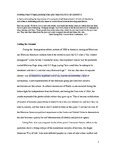Power Structure, Minorities and the Politics of Identity: A Theory Advocating the Importance of Movements of Self Determination of Cultural Identity by Minorities in Addressing Minority Issues in Multicultural Societies Favoring Assimilation

View/
Author
Banerjee, Bhaskar
Subject
Washington and Lee University, Shepherd Poverty Program
Group identity
Minorities
Identity politics
Race discrimination
Metadata
Show full item recordDescription
Bhaskar Banerjee is a member of the Class of 2007 of Washington and Lee University. Capstone; [FULL-TEXT FREELY AVAILABLE ONLINE] The paper is divided into two parts. Part 1 studies how inability of minorities in societies which the dominant culture determines the groups identity takes away the minorities capacity for agency and self determinism, and results in political and economic subjugation. This part has two sections, which will study how Mexican Americans in the SouthWest had no control over their identity and thus how society responded to them in the early 20th century, when economic and political marginilization was de jure, and in the 40's to the 50's, when some de jure restrictions were raised but it was still de facto.
Part 2, as I mentioned, posits that cultivation of an independent and united minority identity, of common history, will give those minorities with upward mobility and sufficient social standing a tie of allegiance to those who social conditions still permit from rising above the self sustaining cycles of poverty which cripple generations. This sense of allegiance will allow them to act as representatives of the minority group and address the social issues which disallow proportional representation of minorities in society, and give them the freedoms to independently change their lives. A lack of this cultural solidarity with the minority as a whole, and a lack of identification with rest of the minority group, on the other hand, will encourage those minorities who achieve positions of social significance to pursue their own interests. Without political power the poorest of those among minority groups cannot exert any pressure on their “representatives”, while the dominant interest groups in society definitely can. . . . If the minority groups as a whole are not brought up to a position where they are equipped to participate on equal footing, then inequality will persist, and race will always be a factor in deciding the merit of individuals because of the sheer lack of proportional representation in the institutions of society. [From The Theory] Bhaskar Banerjee